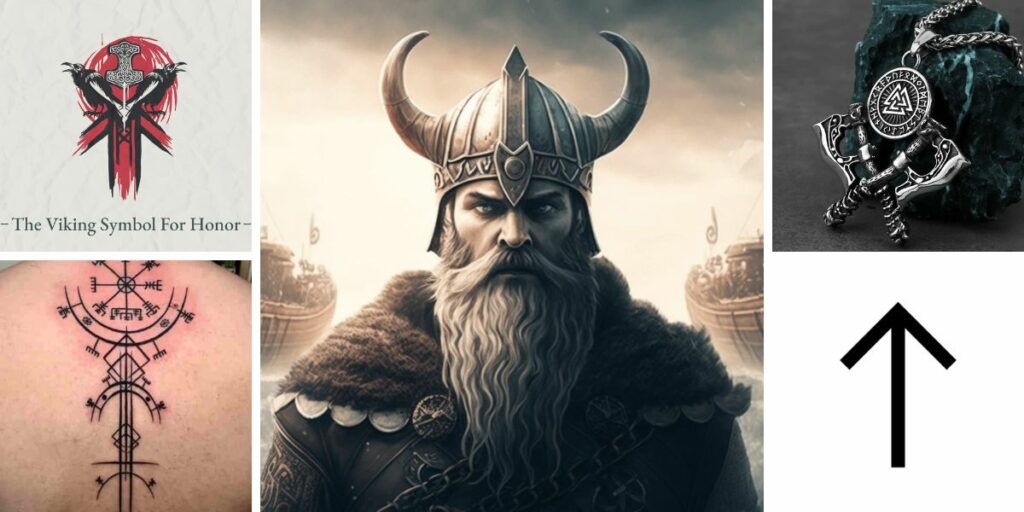The enigmatic allure of Viking symbols, particularly runes, continues to captivate those drawn to Norse heritage. These ancient characters are more than mere letters; they embody virtues like courage, loyalty, and honour. At the heart of this exploration lies the Viking rune for honour, a concept deeply woven into the Norse ethos. The Tiwaz rune (ᛏ), tied to the god Týr, stands as the primary symbol of honour, justice, and sacrifice. This article delves into the significance of Tiwaz, alongside other runes—Algiz, Nauthiz, and Hagalaz—that reflect facets of honour. Through historical context, Rune Poems, and personal reflection, we uncover how these symbols resonate with the timeless pursuit of honour.
Tiwaz – The Heart of Viking Honour
What is Tiwaz?
The Tiwaz rune (ᛏ), also known as Teiwaz or the Tyr rune, resembles an upward arrow or spear, symbolising direction and purpose. Named after Týr, the Norse god of law, justice, and heroic glory, Tiwaz embodies the Norse rune for honour. Its core meanings include honour, righteousness, leadership, victory through fair means, and self-sacrifice. Týr’s most famous act—sacrificing his hand to bind the monstrous wolf Fenrir—exemplifies the rune’s association with courage and cosmic order. This sacrifice underscores that true honour often demands personal loss for the greater good.
Tiwaz in the Rune Poems
The Rune Poems, historical texts from Icelandic, Norwegian, and Anglo-Saxon traditions, offer insight into rune meanings. The Old Norwegian Rune Poem describes Týr as “the one-handed god” and a “leavings of the wolf,” highlighting his sacrifice and role as a just leader. The Anglo-Saxon poem links Tiwaz to guidance and glory, portraying it as a steadfast star for warriors. When asked, “What is the Viking rune for god?” Tiwaz directly connects to Týr, distinct from Ansuz, which relates to Odin. These poems cement Tiwaz as the Viking rune for honour, representing integrity and leadership.
Why Tiwaz Embodies Honour
Tiwaz transcends battlefield glory, encapsulating the Viking ideal of honour through keeping oaths, upholding societal laws, and acting with integrity. It reflects the courage to sacrifice for others, as Týr did, and the resolve to maintain justice in a chaotic world. For Vikings, honour was not just personal but communal, binding individuals to their kin and gods. Tiwaz, as the Norse rune for honour, remains a powerful symbol of righteous leadership and selfless dedication.
Understanding Runes – Meaning and Context
Runes were far more than an alphabet in Norse culture; they held magical and philosophical significance, used in divination, inscriptions, and rituals. The Rune Poems are our primary source for understanding traditional rune meaning, offering cultural and contextual insights into each symbol’s essence. However, interpretations varied across time and regions. A rune’s meaning depended on its use—whether as a single symbol, part of a bindrune, or in an inscription. Honour, while most closely tied to Tiwaz, was not exclusive to one rune, as other symbols like Algiz, Nauthiz, and Hagalaz also reflect its multifaceted nature.

Companions on the Path: Algiz, Nauthiz, Hagalaz & Honour
Introduction
Honour is a complex virtue, interwoven with qualities like protection, endurance, and resilience. While Tiwaz is the cornerstone Viking rune for honour, other runes—Algiz, Nauthiz, and Hagalaz—illuminate its broader dimensions, revealing how honour is achieved and sustained.
Algiz (ᛉ) – The Protector
Rune meaning: Algiz, often called the “life-rune,” represents protection, defence, instinct, and a connection to the divine or ancestors. It symbolises a shield, guarding both the physical and spiritual self.
Link to Honour: Honour requires the ability to protect one’s principles, kin, and community. Algiz embodies the divine favour sought by the honourable, ensuring survival to uphold one’s values. It reflects the strength to stand firm, making it a vital companion to the Norse rune for honour.
Nauthiz (ᚾ) – Need, Constraint
Rune meaning: Nauthiz signifies necessity, hardship, endurance, and overcoming challenges. It represents the friction of survival and the inner fire needed to persevere.
Link to Honour: Honour is often forged in adversity. Nauthiz embodies the resilience required to act honourably despite scarcity or opposition. It tests one’s commitment to integrity under pressure, proving that true honour endures through hardship—a key aspect of the Viking ethos.
Hagalaz (ᚺ) – Hail, Disruption
Rune meaning: Hagalaz symbolises hail, chaos, and uncontrollable forces. It represents destruction but also the potential for renewal, like a seed surviving a storm.
Link to Honour: Honour shines brightest in times of crisis. Hagalaz challenges individuals to maintain integrity and protect others amidst chaos. Making righteous choices during disruption is the ultimate expression of honour, and Hagalaz hints that destruction can pave the way for honourable new beginnings.
Finding Your Connection
How to Find Your Viking Rune?
Historically, Vikings used runes for divination, such as casting stones, or connected to them through ancestral ties. Today, finding your rune is a personal journey. Begin by researching rune meaning through the Rune Poems, which provide authentic insights. Meditate on symbols like Tiwaz, reflecting on its themes of justice and sacrifice, or Algiz for protection. Consider which rune aligns with your current challenges or aspirations related to honour. For some, Tiwaz’s call to integrity resonates deeply; others may feel drawn to Nauthiz’s endurance. This introspective process is not prescriptive but a meaningful exploration of personal resonance.
Conclusion
The Tiwaz rune (ᛏ) stands as the quintessential Viking rune for honour, embodying justice, sacrifice, and integrity through its connection to Týr. Its companions—Algiz, Nauthiz, and Hagalaz—reflect honour’s complexity, highlighting protection, endurance, and resilience in chaos. Guided by the Rune Poems, these symbols offer a profound window into the Viking ethos, where honour was both personal and communal. Whether drawn to Tiwaz’s righteous leadership or Hagalaz’s transformative potential, the pursuit of honour remains a timeless ideal, as relevant today as it was in the Norse world.

